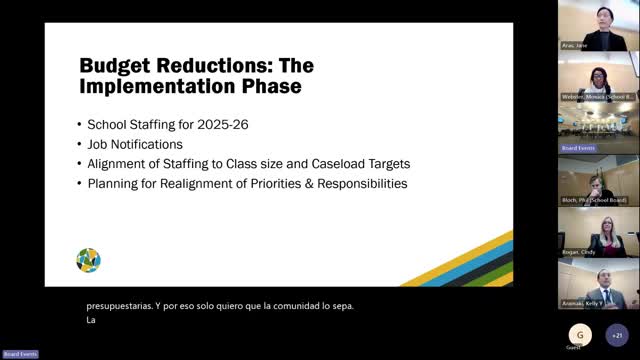Bellevue district to implement $20 million in cuts, shift elementary bell times to save transportation costs
Get AI-powered insights, summaries, and transcripts
Subscribe
Summary
Superintendent outlined a plan to implement $20 million in spending reductions, including school bell-time changes and bus-route consolidations that district staff say will save more than $200,000 and reduce bus miles by about 42,646 per year.
Bellevue School District Superintendent Dr. Aramaki announced the start of implementing $20,000,000 in spending reductions and described immediate changes to elementary and middle‑school bell times intended to cut transportation costs and reduce bus miles.
The superintendent said the district has begun job notifications tied to staffing reductions and that administrators are aligning staffing to projected class sizes and caseload targets. “The next hard part in our community is happening right now, which is the implementation of these $20,000,000 of cuts,” Dr. Aramaki said.
District staff presented a plan to move elementary schools to a two‑tier bell schedule (an “early” and a “late” start) so buses can serve schools in tighter geographic zones. The district identified specific elementary changes: Clyde Hill moving from an 8:00 a.m. start to a 9:00 a.m. start; Lake Hills moving earlier and one paired school moving later; and Somerset moving to an 8:00 a.m. start to enable more efficient routing in the south end. For middle schools, staff said modest start/finish adjustments will better align periods between receiving and sending schools.
Staff estimated the elementary-level bell-time changes will save more than $200,000 annually — “equivalent to the cost of an assistant principal or a counselor plus a paraprofessional,” the superintendent said — and reduce annual bus travel by about 42,646 miles. The district said it is coordinating with child‑care partners including the Bellevue Boys & Girls Club and Right at School to provide before- and after‑school options for families affected by schedule shifts.
The superintendent told the board the district has received “a number of emails” from families concerned about Somerset’s move to an earlier start because the school sits on a steep hill. He said the district considered weather and hill conditions and will work with Somerset during inclement weather.
On federal funding and state legislation, Dr. Aramaki told the board the district receives about $12,000,000 in federal funding that supports special education and Title I programs and warned of uncertainty after a federal executive action reported that day. He also said the district is tracking two state bills that would provide new revenue to districts: “senate bill 52 63,” which he said would bring almost $5,000,000 for special education, and “senate bill 51 92,” which he said would bring about $2,400,000 in MSOC (materials, supplies, operating costs) funding.
Board members pressed for better routine review of agenda items that carry financial impact and discussed whether warrant approvals and personnel transactions should be removed from the consent agenda for more deliberation in future meetings.
The district said it will continue community outreach through April and after spring break to explain staffing and bell‑time impacts, and will work with families and staff through the transition period.
The superintendent also confirmed the last day of school for 2024–25 will be Wednesday, June 24, 2025.
